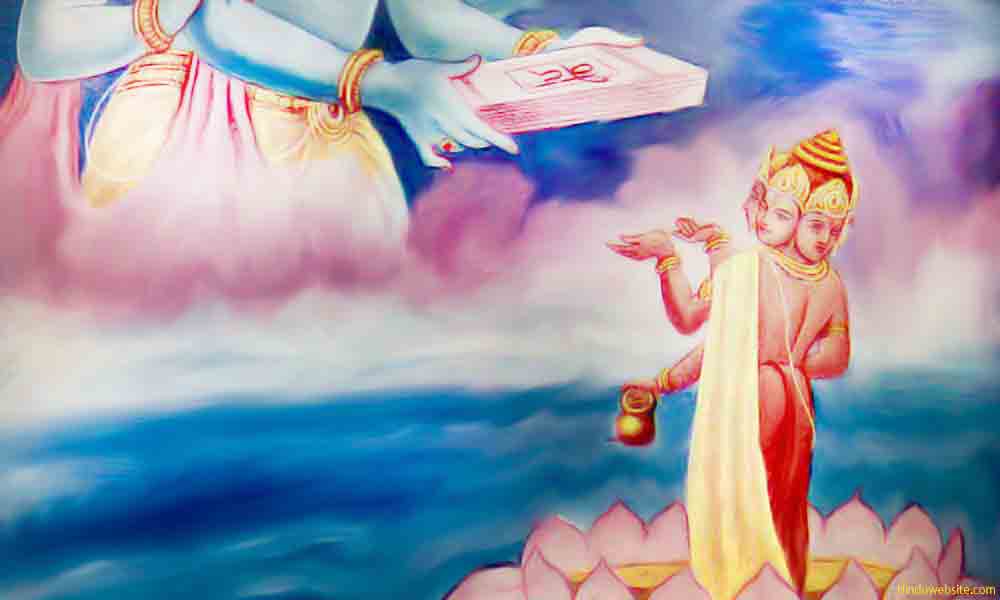
The Meaning and Concept of Sruthi in Hinduism

Sruthi or Sruti means that which is or was heard. Sru means to hear. Iti mean thus. Sruti means thus heard. In a general sense, sruti means anything that you hear from others, including a rumor or news. Srutam is the object of hearing. Srotha means the audience, or those who hear a speech. In a religious or spiritual sense, sruti means the knowledge which was heard by revelation. It includes the knowledge heard from God, a divine being, a spiritual teacher or an enlightened person.
The Vedas are considered sruthi because they were believed to have been originally heard from Brahma by the Vedic seers who then transmitted it to their successors and pioneered a tradition that continued for several generations. Until two hundred years ago, the Vedas were transmitted only orally by teachers to a student. Thus, sruthi means that which is heard from God or from a guru. Since the knowledge of the Vedas is gained by hearing, they are also known as anusrava or that which has been heard.
Although this is the general meaning and there are several texts which trace their origin to Brahma, Vishnu, Shiva or other divinities, for reasons not clear to us only the Vedas are considered sruthi and the rest are considered smrithi or smriti, meaning the memorial texts. Examples of Smriti texts are the Dharmashastras, the Sutra literature, the Vedangas, several bhashyas, gitas, gathas, itihasas, tantras and Puranas. They may contain divine teachings, as in case of the Bhagavadgita. However, they are not considered sruthi.
The Vedas are four namely the Rigveda, the Samaveda, the Yajruveda and the Atharvaveda. They contain thousands of hymns which are mostly invocations to various gods. Each Veda is further divided into Samhita, Brahmana, Aranyaka and Upanishad. Knowledge of the first two is useful to perform Vedic rituals and sacrifices while that of the last two is useful in spiritual and contemplative practices.
Since the knowledge of the Vedas is considered divine in origin, they are used as verbal testimony (sabda pramana) to establish truths that cannot be easily ascertained with the help of the senses, the mind or human intelligence. For example, we do not know the nature of Brahman, who is beyond the mind and the senses, invisible and beyond our grasp. How can we know him who is indescribably, indefinable, unknown, invisible and infinite? He may be known in transcendental states of self-absorption. However, how can we be sure that what we have experienced is indeed the state of Brahman or the Self? It is by studying the Vedas, especially the Upanishads, and comparing our experience to the knowledge of Brahman which they declare to be true. The same knowledge can be used to strengthen our faith or beliefs about God and existence, which cannot be validated by other means.
Suggestions for Further Reading
- Hinduism and Prayers
- The Amazing Power of Manasa Puja or Mental Worship
- Popular Prayers of Hindu Gods and Goddesses
- The Vedas as the Source of Valid Knowledge
- Ritual and Spiritual Aspects of the Vedic Tradition
- Mantras in Hinduism
- The Mantra Tradition of Hinduism
- About the Vedas and Vedic Literature
- Links to Sanskrit Mantras, Slokas and Prayers
- Samskaras, The Rites and Rituals in Hinduism
- Significance of Rituals in Hinduism
- Why Idol Worship or Image Worship is Justified in Hinduism?
- Reasons For Idol Worship in Hinduism
- Hindu Marriages And The Duties Of Husband And Wife In A Traditional Hindu Family
- Essays On Hindu Festivals
- Origin, Definition and Introduction to Hinduism
- Symbolic Significance of Numbers in Hinduism
- The Belief of Reincarnation of Soul in Hinduism
- The True Meaning Of Renunciation According To Hinduism
- The Symbolic Significance of Puja Or Worship In Hinduism
- Introduction to the Upanishads of Hinduism
- Origin, Principles, Practice and Types of Yoga
- Essays On Dharma
- Esoteric Mystic Hinduism
- Introduction to Hinduism
- Hindu Way of Life
- Essays On Karma
- Hindu Rites and Rituals
- The Origin of The Sanskrit Language
- Symbolism in Hinduism
- Essays on The Upanishads
- Concepts of Hinduism
- Essays on Atman
- Hindu Festivals
- Spiritual Practice
- Right Living
- Yoga of Sorrow
- Happiness
- Mental Health
- Concepts of Buddhism
- General Essays